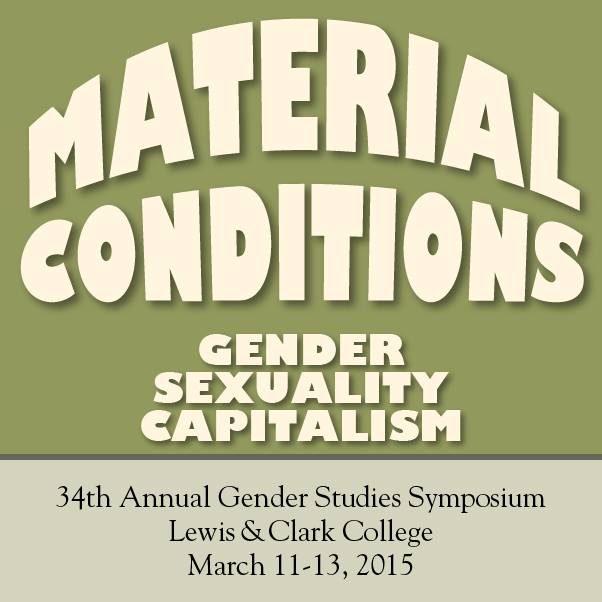
Capitalism conversation started with symposium
By KT Kelly /// Staff Writer
On March 11-13, Lewis & Clark College will host its 34th annual Gender Studies Symposium, Material Conditions: Gender, Sexuality and Capitalism. This event, co-chaired by Annabel Carroll (‘15), Maria Boyer (‘15) and Karma Rose Macias (‘15), will draw connections from gender and sexuality to production and consumption, and the other way around.
The team started planning last year, but it took a while to create a concrete theme. “We started brainstorming last summer with just the key words ‘production and consumption’ in mind,” Carroll said in an email on March 4. “They can both be very hazily defined, so it took us some months before we were ready to narrow the conversation we imagined having to the ways capitalism interacts with gender and sexuality.”
The co-chairs worked long and hard on the symposium, and while it was a lot of work, the reward outweighs the time commitment. “We worked consistently through the summer with weekly meetings using Google conferences to discuss thematic ideas, discuss keynote options, pool our research, etc,” Boyer said in an email on March 4. “It is nearly a year’s worth of work full circle, and commands an immense amount of work, most of which is very fun but some of which is a logistical and coordinating nightmare.”
This is not Carroll or Boyer’s first Gender Studies Symposium, and there is a reason they keep coming back. “I’ve attended the symposium and been on the planning committee for several of my LC years,” Boyer said. “The opportunity to help create something that I have found so profound, experiences that for me have been so formative and inspiring and encouraging to my worldview and my feminism, is one that was both daunting and something I desperately wanted.”
Each year the symposium brings something new. “I’ve actually participated in every Gender Studies Symposium since I was a freshman — mostly handing out pens and programs and going to committee meetings,” Carroll said. “Understanding the level of organizational effort that goes into something like this has definitely made me appreciate it more. And the symposium itself is different every year.”
The Gender Studies Symposium gives LC students a way to not only participate on campus, but also carry the rest of the community. “It’s a good thing to support other Lewis & Clark students — everyone on the planning committee who helped plan the event and everyone presenting their research projects and thesis work,” Carroll said. “It’s not particularly common for academic conferences to include undergraduate students on the same panels with professors and PhD candidates, but we do, and I think that’s important.”
However, this event also serves to educate and ground students. “Our school is one which is privately funded and experiences a range of wealth disparities and origins, privileges and struggles — and these differences are often undermined or ignored,” Boyer said. “We don’t often explicitly think of the initiate relationship between gender, sexuality, and capitalism — and the way in which the contemporary constructions and historical perspectives upon gender and sexuality would not be what they are without the presence and influence of capitalism.”
Boyer notes that this is a crucial conversation to have. “Gender and sexuality are similarly implicit forces, embedded ideas, lived experiences and mediators.” Boyer said. “In everything we do, there are assumptions, ingrained systems of value and resistance, struggle and satisfaction, hierarchy and oppression. If we are to talk of gender, we must speak of capitalism, and vice versa.”
This symposium is a means to introduce students and the community new concepts. “Hopefully people will discover new books, new scholars and activists, and maybe even entire new fields of study — like food studies, transnational studies, prison abolition, disability theory, to name a very few — that really interest them,” Carroll said. “And if, after the symposium, capitalism seems like a slightly less unassailable way of being to a few people, that’d be nice too.”
However, like most symposiums, this one aims to create a discussion and keep the conversation going. “My ideal way for attendees to leave their experience with the symposium, to whatever extent they engage with the widely varying topics and events, is feeling empowered, pensive and catalyzed,” Boyer said. “I want folks to have learned something that they can’t help continuing to think about, to have drawn connections and conceived of possibilities in action, in thought, in the future of everyone’s lives. And I want people to talk to each other about it! This symposium should generate, not stagnate.”
Subscribe to the Mossy Log Newsletter
Stay up to date with the goings-on at Lewis & Clark! Get the top stories or your favorite section delivered to your inbox whenever we release a new issue.

Leave a Reply